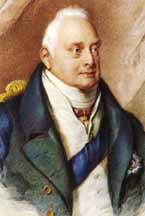 William IV
William IVHouse of Brunswick, Hanover Line -- Reigned: 1830-1837 1765-1837
Upon the death of Princess Charlotte, daughter and heir of George IV, the surviving children of George III were required to hastily make arrangements to secure the Hanoverian succession; William abandoned Mrs. Jordan and, after several rebuffs, married Adelaide of Saxe-Coburg and Meinengein, who bore him two daughters (both of which died in early childhood). William IV died of pneumonia on June 20, 1837, leaving no legitimate children. William succeeded his brother, George IV, and was welcomed with open arms by the British public, who had grown weary of the excesses of the fourth George. William possessed an unassuming character, exemplary private life, and disdain for pomp and ceremony. Court life became somewhat lackluster, adding to the generally low opinion that had formed concerning the monarchy. William did little to counteract such feelings, but never generated the embarrassment and scandal of his Hanoverian predecessors. Parliamentary reform was the order of the day. The county franchise had not been updated since its inception during the reign of Henry VI, in 1430. Only freeholders in the counties were eligible to vote; separate boroughs required various qualifications to vote. The industrial and agricultural revolutions, increases in population and trade and migration from the country to the city left England with a dilapidated, ineffective system of representation that only benefited the aristocracy. Lord Grey, with William's support, pushed a reform bill through the Commons in 1831, which was defeated by paranoid Peers in the House of Lords. A second bill was offered and likewise defeated. In 1832, the third version of the bill passed in both chambers, but only because William threatened to create enough new peerages to insure passage of the bill. The Reform Act of 1832 extended the voting franchise to middle class land owners and became the basis for further acts which eventually enfranchised all adult subjects. The fight for democracy was sweeping Europe, with dire consequences for royalty. William's unremarkable character was instrumental in England passing through this era unscathed. He was the only European monarch of the age to survive the advent of democracy. Upon the death of the unimpressive king, the Spectator issued the following eulogy:
His death separated the joint rule of England and Hanover: his niece Victoria ascended the throne of England, but was barred by Salic law from ruling in Hanover, which passed into the hands of William's brother Ernest, Duke of Cumberland. |
All rights reserved. For details and contact information: See License Agreement, Copyright Notice. |
 William IV, born August 21, 1765, was the third son of
William IV, born August 21, 1765, was the third son of